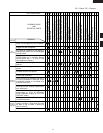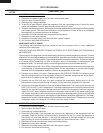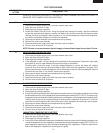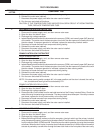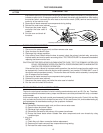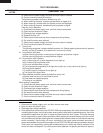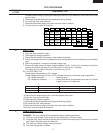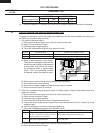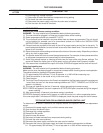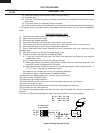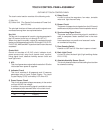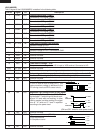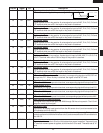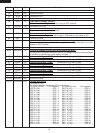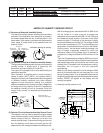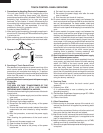
19
R-530EK
R-530EW
TEST PROCEDURES
PROCEDURE
LETTER
COMPONENT TEST
10) Discharge high voltage capacitor.
11) Reconnect all leads removed from components during testing.
12) Re-install the outer case (cabinet).
13) Reconnect the power supply cord after the outer case is installed.
14) Run the oven and check all functions.
N AH SENSOR TEST
Checking the initial sensor cooking condition
WARNING : The oven should be fully assembled before following procedure.
(1) The oven should be plugged in at least two minutes before sensor cooking.
(2) Room temperature should not exceed 95˚F (35˚C).
(3) The unit should not be installed in any area where heat and steam are generated. The unit should
not be installed, for example, next to a conventional surface unit. Refer to the “INSTALLATION
INSTRUCTIONS” of the operation manual.
(4) Exhaust vents are provided on the back of the unit for proper cooling and air flow in the cavity. To
permit adequate ventilation, be sure to install so as not to block these vents. There should be some
space for air circulation.
(5) Be sure the exterior of the cooking container and the interior of the oven are dry. Wipe off any moisture
with a dry cloth or paper towel.
(6) The Sensor works with food at normal storage temperature. For example, chicken pieces would be
at refrigerator temperature and canned soup at room temperature.
(7) Avoid using aerosol sprays or cleaning solvents near the oven while using Sensor settings. The
sensor will detect the vapor given of by the spray and turn off before food is properly cooked.
(8) If the sensor has not detected the vapor of the food, ERROR will appear and the oven will shut off.
Water load cooking test
WARNING : The oven should be fully assembled before following procedure.
Make sure the oven has been plugged in at least two minutes before checking sensor cook operation.
The cabinet should be installed and screws tightened.
(1) Fill approximately 200 milliliters (7.2 oz) of tap water in a 1000 milliliter measuring cup.
(2) Place the container on the center of tray in the oven cavity.
(3) Close the door.
(4) Touch the Timer/Clock pad once, the Power Level pad twice, the Start pad once and the number pad
1 once. Now, the oven is in the sensor cooking condition and "TEST", “SENSOR” and "COOK" will
appear in the display.
(5) The oven will operate for the first 16 seconds, without generating microwave energy.
NOTE: ERROR will appear if the door is opened or STOP/CLEAR pad is touched during first stage of
sensor cooking.
(6) After approximately 16 seconds, microwave energy is produced.
If ERROR is displayed, replace the AH sensor or check the control unit, refer to explanation below.
If the oven stops after 5 minutes and ERROR is displayed, check the parts except for the AH sensor.
TESTING METHOD FOR AH SENSOR AND/OR CONTROL UNIT
To determine if the sensor is defective, the simplest method is to replace it with a new replacement
sensor.
(1) Disconnect the power supply cord, and then remove outer case.
(2) Open the door and block it open.
(3) Discharge high voltage capacitor.
(4) Remove the AH sensor.
(5) Install the new AH sensor.
(6) Reconnect all leads removed from components during testing.
(7) Re-install the outer case (cabinet).
(8) Reconnect the power supply cord after the outer case is installed.
(9) Reconnect the oven to the power supply and check the sensor cook operation as follows:
9-1. Fill approximately 200 milliliters (7.2 oz) of tap water in a 1000 milliliter measuring cup.



